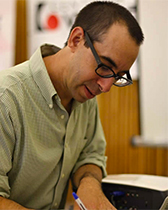Benjamin Frommer
Associate Professor of History
Curriculum Vitae

- b-frommer@northwestern.edu
- 847-491-7191
- Harris 237
- Office Hours: Wednesdays 2:00pm - 4:00pm
Interests
Geographic Field(s): Modern European History: Central/Eastern Europe
Thematic Field(s): Legal and Criminal History
Principal Research Interest(s): Central European History
Biography
Benjamin Frommer (Ph.D., Harvard, 1999), Associate Professor of History, is the author of National Cleansing: Retribution against Nazi Collaborators in Postwar Czechoslovakia (New York: Cambridge University Press, 2005), which was also published in Czech translation (Prague: Academia, 2010), and co-editor of Intermarriage from Central Europe to Central Asia: Mixed Families in the Age of Extremes (Lincoln: University of Nebraska Press, 2020). His current book project, The Ghetto without Walls: The Holocaust in the Nazi Protectorate of Bohemia and Moravia, examines the wartime destruction of one of the world's most integrated and intermarried Jewish communities. His research and writing have been supported by the American Council of Learned Societies, the Fulbright Program, the Institut für die Wissenschaften vom Menschen, the Alice Kaplan Institute for the Humanities, and the Masaryk Institute of the Czech Academy of Sciences. He has received the Weinberg College Distinguished Teaching Award (2007) and held the Wayne V. Jones Research Professorship in History (2010-2012) and the Charles Deering McCormick Professorship of Teaching Excellence (2013-2016). From 2013 to 2016 Frommer served as the inaugural Director of the Holocaust Educational Foundation of Northwestern University.
Affiliated Programs
Publications
- Intermarriage from Central Europe to Central Asia: Mixed Families in the Age of Extremes. Co-edited and introduced with Adrienne Edgar. Lincoln: Nebraska University Press, June 2020.
- National Cleansing: Retribution against Nazi Collaborators in Postwar Czechoslovakia (New York: Cambridge University Press, 2005), published in Czech translation by Academia Publishers (Prague, 2010).
- “Privileged Victims: Intermarriage between Jews, Czechs and Germans in the Nazi Protectorate of Bohemia and Moravia,” in Intermarriage from Central Europe to Central Asia: Mixed Families in the Age of Extremes, edited and introduced by Adrienne Edgar and Benjamin Frommer, pp. 47-82. Lincoln: Nebraska University Press, 2020.
- “The Holocaust in Bohemia and Moravia,” in Prague and Beyond: The History of the Jews in the Bohemian Lands, ed. by Kateřina Čapková and Hillel Kieval. Philadelphia: University of Pennsylvania Press, forthcoming 2020. Published in German translation: “Der Holocaust in Böhmen und Mähren,” pp. 265-318, in Kateřina Čapková and Hillel Kieval, eds., Zwischen Prag und Nikolsburg: Jüdisches Leben in den böhmischen Ländern, transl. by Peter Groth. Munich: Vandenhoeck & Ruprecht, 2020. Also forthcoming in Czech and Hebrew translations.
- “Honorary Czechs and Germans: Petitions for Aryan Status in the Nazi Protectorate of Bohemia and Moravia,” in Petitions Resisting Persecution: Negotiating Self-Determination and Survival of European Jews, ed. by Wolf Gruner and Thomas Pegelow Kaplan. New York: Berghahn Books, forthcoming 2020.
- “The Saved and the Betrayed: Hidden Jews in the Nazi Protectorate of Bohemia and Moravia,” Unlikely Heroes: The Place of Holocaust Rescuers in Research and Teaching, ed. by Ari Kohen and Gerald J. Steinacher (Lincoln, NE: Nebraska University Press, 2019), pp. 37-56.
- “Verfolgung durch die Presse: Wie Prager Büroberater und die tschechische Polizei die Juden des Protektorats Böhmen und Mähren isolieren halfen” [Persecution through the Press: How Prague Bureaucrats and the Czech Police Helped to Isolate the Jews of the Protectorate of Bohemia and Moravia.] Leben und Sterben im Schatten der Deportation: Der Alltag der jüdischen Bevölkerung im Großdeutschen Reich 1941-1945, ed. by Doris Bergen, Andrea Löw and Anna Hájková (Oldenbourg: München, 2013), 137-150.
- “Denouncers and Fraternizers: Gender, Collaboration, and Retribution in Bohemia and Moravia during the Second World War and After.” Gender and War in 20th-Century Eastern Europe, ed. by M. Bucur and N. Wingfield (Bloomington: Indiana UP, 2006).
- “Getting the Small Decree: Czech National Honor in the Aftermath of the Nazi Occupation.” Constructing Nationalities in East Central Europe, ed. by Pieter M. Judson and Marsha L. Rozenblit (New York: Berghahn Books, 2004), 267-282.
- “Expulsion or Integration: Unmixing Interethnic Marriage in Postwar Czechoslovakia.” East European Politics and Societies 14:2 (Spring 2000), 381-410.
Teaching Interests
Undergraduate Courses
- Collaboration and Complicity in the Holocaust.
- Culture and History of Eastern Europe.
- East-Central Europe from the First to the Second World War.
- East-Central Europe under Communist Rule and Beyond, 1945 to the Present.
- Europe since 1945.
- History of the Holocaust.
- Justice for the Holocaust? Prosecuting Nazi War Criminals.
- Modern Europe since 1750.
- Retribution against War Criminals and Collaborators in 20th-Century Europe.
- Second World War in Europe.
- Testimony and Justice (Kaplan Humanities Scholars Program).
Graduate Courses and Tutorials
- Historiography of Communist East Europe.
- Historiography of Forced Migration and Genocide.
- Historiography of Modern Germany.
- Historiography of the Habsburg Monarchy.
- Nations and Nationalism in Modern Europe.
Recent Awards and Honors
- Charles Deering McCormick Professorship of Teaching Excellence (2013-2016).
- Visiting Fellow, Masaryk Institute of the Czech Academy of Sciences (2013).
- Alice Kaplan Institute for the Humanities Fellowship (2012-2013).
- Wayne V. Jones Research Professorship in History (2010-2012).
